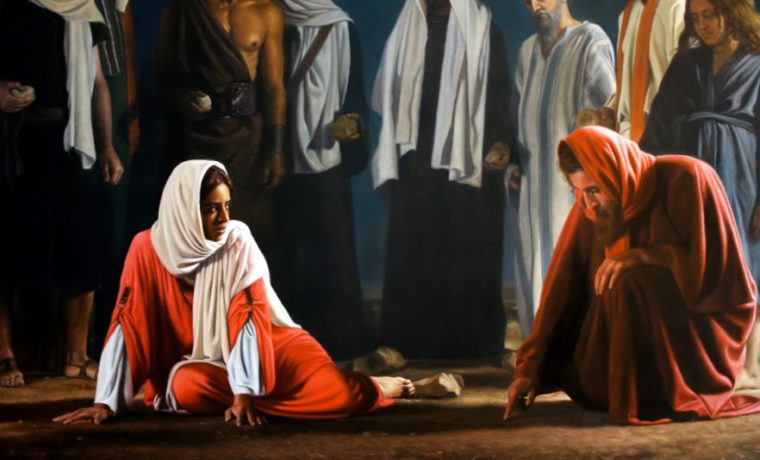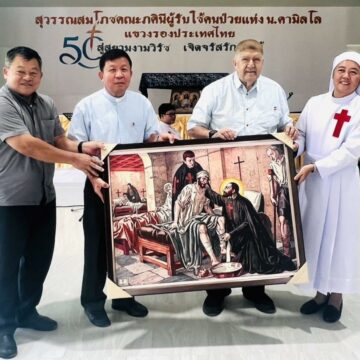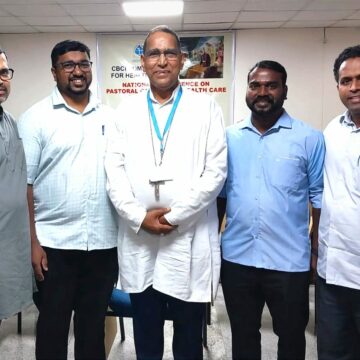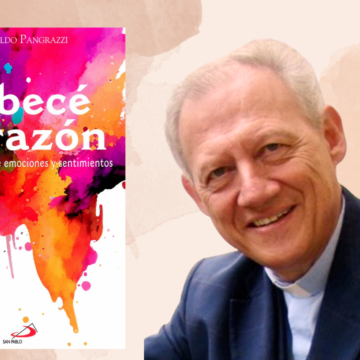From St. Augustine, En. in ps. 50, 8
Remansit adultera et Dominus, remansit vulnerata et medicus, remansit magna miseria et magna misericordia.
The adulterous woman remained and the Lord; she who was wounded remained and the physician; the great misery remained and the great mercy.
From St. Augustine, Serm. 16/A, 5
Remansit solus et sola; remansit creator et creatura; remansit miseria et misericordia; remansit quae suum reatum agnoscebat, et qui peccatum dimittebat.
He and she remained alone; the Creator remained and the creature; misery remained and mercy; she remained, aware of her crime, and he who forgave her sin.
 ‘Mercy cannot become a mere parenthesis in the life of the Church’ because the encounter of Jesus and the adulterous woman is the ‘icon’ not only of the extraordinary Holy Year that has just come to an end but also of the style of a Christian: ‘Mercy cannot become a mere parenthesis in the life of the Church; it constitutes her very existence, through which the profound truths of the Gospel are made manifest and tangible. Everything is revealed in mercy; everything is resolved in the merciful love of the Father’.
‘Mercy cannot become a mere parenthesis in the life of the Church’ because the encounter of Jesus and the adulterous woman is the ‘icon’ not only of the extraordinary Holy Year that has just come to an end but also of the style of a Christian: ‘Mercy cannot become a mere parenthesis in the life of the Church; it constitutes her very existence, through which the profound truths of the Gospel are made manifest and tangible. Everything is revealed in mercy; everything is resolved in the merciful love of the Father’.
The Jubilee has ended; the Jubilee continues. In his apostolic letter Misericordia et misera Pope Francis states that ‘it is the time of mercy’ and hopes for ‘pastoral conversion’ which places the poor and listening to people at the centre of things. ‘May our communities reach out to all who live in their midst, so that God’s caress may reach everyone through the witness of believers’: the temptation to ‘theorise about of mercy’ can be overcome ‘to the extent that our daily life becomes one of participation and sharing’.
‘In a culture often dominated by technology, sadness and loneliness appear to be on the rise, not least among young people’. To achieve a future that is not ‘prey to an uncertainty’, mercy is the only antidote to ‘depression, sadness and boredom, which can gradually lead to despair’.
No to ‘illusions that promise quick and easy happiness through artificial paradises’, yes to mercy as a ‘gusting and wholesome wind’, in relation to which ‘we cannot remain unaffected, for it changes our lives’, as, indeed, we experienced during the jubilee year which we have just celebrated. Now ‘it is time to look ahead’ through ‘pastoral conversion’ in the liturgy, in the sacraments, in the catechesis, in listening to the Word of God, in attending to, and preparing, a homily. ‘I greatly desire that God’s word be increasingly celebrated, known and disseminated’, writes the Pope, proposing a Sunday dedicated ‘entirely’ to the Bible, with initiatives of pastoral ‘creativity’, including ‘the widest practice of lectio divina’.
‘The Sacrament of Reconciliation must regain its central place in the Christian life, observed Francis when continuing the ministry of the 1,142 ‘Missionaries of mercy’ sent into the dioceses of the world during the Jubilee. ‘We confessors’, he adds providing careful provisions for the exercise of ministry, ‘feel responsible, then, for actions and words that can touch the heart of penitents and enable them to discover the closeness and tenderness of the Father who forgives’.
In the ‘most complex cases as well’. ‘I henceforth grant to all priests, in virtue of their ministry, the faculty to absolve those who have committed the sin of procured abortion’. This is the most striking innovation of this document, in which the faculty of the priests of the Fraternity of St. Pius X to absolve their faithful of sins is also extended ‘until further provisions are made’.
‘In the sacramental life, mercy is granted us in abundance. It is not without significance that the Church mentions mercy explicitly in the formulae of the two “sacraments of healing”, namely, the  sacrament of Penance and Reconciliation and the sacrament of the Anointing of the Sick. In the first, the formula of absolution reads: “God, the Father of mercies, through the death and resurrection of his Son has reconciled the world to himself and sent the Holy Spirit among us for the forgiveness of sins; through the ministry of the Church may God give you pardon and peace”. In the second, the formula of anointing reads: “Through this holy anointing, may the Lord in his love and mercy help you with the grace of the Holy Spirit”. In the Church’s prayer, then, references to mercy, far from being merely exhortative, are highly performative, which is to say that as we invoke mercy with faith, it is granted to us, and as we confess it to be vital and real, it truly transforms us. This is a fundamental element of our faith, and we must keep it constantly in mind. Even before the revelation of sin, there is the revelation of the love by which God created the world and mankind. Love is the first act whereby God makes himself known to us and comes to meet us. So let us open our hearts and trust in God’s love for us. His love always precedes us, accompanies us and remains with us, despite our sin’.
sacrament of Penance and Reconciliation and the sacrament of the Anointing of the Sick. In the first, the formula of absolution reads: “God, the Father of mercies, through the death and resurrection of his Son has reconciled the world to himself and sent the Holy Spirit among us for the forgiveness of sins; through the ministry of the Church may God give you pardon and peace”. In the second, the formula of anointing reads: “Through this holy anointing, may the Lord in his love and mercy help you with the grace of the Holy Spirit”. In the Church’s prayer, then, references to mercy, far from being merely exhortative, are highly performative, which is to say that as we invoke mercy with faith, it is granted to us, and as we confess it to be vital and real, it truly transforms us. This is a fundamental element of our faith, and we must keep it constantly in mind. Even before the revelation of sin, there is the revelation of the love by which God created the world and mankind. Love is the first act whereby God makes himself known to us and comes to meet us. So let us open our hearts and trust in God’s love for us. His love always precedes us, accompanies us and remains with us, despite our sin’.
‘The Jubilee now ends and the Holy Door is closed. But the door of mercy of our heart continues to remain wide open’. ‘May our communities reach out to all who live in their midst, so that God’s caress may reach everyone through the witness of believers’, is the invitation of Pope Francis: the temptation to ‘theorise about of mercy’ can be overcome ‘to the extent that our daily life becomes one of participation and sharing’.
Mercy also has a ‘social value’: ‘Mercy impels us to roll up our sleeves and set about restoring dignity to millions of people; they are our brothers and sisters who, with us, are called to build a “city which is reliable”’. Many ‘concrete signs’ have been performed during the Jubilee. ‘But this is not enough. Our world continues to promote new forms of spiritual and material poverty that assault human dignity’.
‘Now is the time to unleash the creativity of mercy, therefore, in order to develop a ‘culture of mercy’ that is a ‘revolution’ and not ‘theory’.
‘It is the time of mercy’, repeats Francis five times: ‘for each and all, since no one can think that he or she is cut off from God’s closeness and the power of his tender love’.
READ















Camillians on Facebook
Camillians on Twitter
Camillians on Instagram